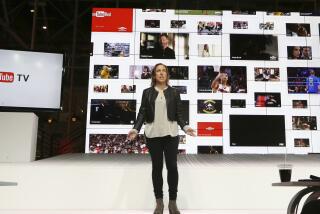A Role That She Seemed Destined to Land
- Share via
In her show business debut, Google Inc.’s ambassador to Hollywood ended up on the cutting-room floor.
Jennifer Feikin was a teenager when she donned a miniskirt and beehive hairdo for a bit part in John Waters’ movie “Hairspray.” It went on to become a cult classic, but without Feikin’s scene as an auto show model.
“She didn’t like the idea of not seeing things through to the end,” said Feikin’s mother, Rhea.
Within a decade after her “Hairspray” experience, Feikin had worked her way back into the movies -- this time negotiating big-budget deals for 20th Century Fox.
It’s that sort of determination that Google is counting on as Feikin oversees the new Google Video Store, an online bazaar for selling and renting downloadable TV shows, movies and other material. The Internet search giant faces skepticism from potential media partners, tough competition from established players and the weight of expectations that comes with just being Google.
“That’s what’s so great about right now: We’re just figuring out how to do this,” said Feikin, 38.
The service got a rocky start last week. It was launched three days late because of technical problems, and some users complained about glitches and a shortage of popular TV programming. For example, there were only one episode of CBS’ popular show “CSI: Crime Scene Investigation” and fewer than a dozen music videos from Sony BMG Music Entertainment -- two of Google’s major media partners.
If anyone is prepared to handle the pressure, it’s Feikin, say people who know her.
A Harvard-trained lawyer who’s respected in Silicon Valley and Hollywood, Feikin has handled big-budget movie deals for 20th Century Fox and negotiated contracts for America Online and Google. At 5 feet 10 (an even 6 feet in her high-heel boots), Feikin is athletic and competitive, and that shows on the grueling cycle rides she leads in the Santa Cruz Mountains.
“You’d be riding for four hours, and, climbing the last 2,000 feet, there she comes pushing ahead from behind to get everybody to increase the pace,” said Randy Komisar, a partner with venture capital firm Kleiner Perkins Caufield & Byers. “She attacks and attacks and attacks. She’s someone who keeps pushing until she gets done what she needs to get done.”
At Google, she’s got plenty to do. The company wants Feikin to expand Google’s successful Web search business into video. The idea: Compile video clips into an enormous searchable database and extend opportunities for businesses large and small to profit from it -- Google first and foremost.
To do that, Google needs to speak Hollywood’s language. Although she worked in the film industry for only four years, Feikin is fluent in its particular kind of deal-speak -- a skill that comes in very handy when trying to reconcile the demands of content owners with the computer engineers surrounding her at Google.
“She’s hugely valuable,” said Larry Kramer, president of CBS Digital Media. “It’s like having an American company in South America, and she’s the one who speaks Spanish.”
Bridging the gap between Hollywood and Silicon Valley is a rapidly growing job description as the Internet changes the way people consume entertainment. It’s not an easy task, given the different cultures of the technology and the entertainment industries.
Other Internet companies are trying to graft glitzy Hollywood sensibilities onto their button-down high-tech cultures. America Online, for example, merged with Time Warner Inc. in 2001 and is working closely with its parent company on creating new Web-only video content. Yahoo Inc. is led by former Warner Bros. head Terry Semel, and former ABC Entertainment Television Group Chairman Lloyd Braun is steering Yahoo Media Group as it explores the future of digital media creation and distribution.
Google took a different tack: It promoted from within. Feikin had worked at Google, licensing its search and ad technologies to other companies, since 2002 after two years at AOL. Consequently, Feikin is viewed inside Google less as an outsider from Hollywood than as a seasoned Internet executive who tries to balance the interests of Google users with the demands of content owners.
She can pull the Prada and leather boots out of her closet for meetings with studio chiefs, but she favors jeans and running shoes when working in Google’s relaxed headquarters in Mountain View, Calif. And she can hold her own when talking technical specifications, understanding it just well enough to make engineers and creative executives feel comfortable.
“She understands the technology better than she gives herself credit for,” said Peter Chane, Google Video’s lead product manager and the engineer who started the project.
Feikin caught the show-business bug early.
Her mother has been a Baltimore television personality for decades. Rhea Feikin hosted children’s shows and, accompanied by a puppet named J.P., gave the weather report during the evening news. Feikin’s late stepfather was Colgate Salsbury, a stage, TV and film actor.
Rhea Feikin once brought her young daughter to a cerebral palsy telethon she was hosting and invited Jennifer onto the stage. Asked what she wanted to be when she grew up, Jennifer announced to the world watching, “I want to be Miss America.”
A decade later, director Waters, a family friend, cast her in “Hairspray.” But she had more success behind the camera. Although her scene didn’t make it, she helped cast extras and shuttled actors to the set, earning a film credit as “casting intern.”
She went on to study psychology and anthropology at Duke University, spend a year in Malaysia on a Henry Luce scholarship and graduate from Harvard Law School.
After a stint as a management consultant with McKinsey & Co. in New York, Feikin began looking for ways into the Hollywood machine.
She caught a break when her mother ran into James G. Robinson, the founder of Morgan Creek Productions, who is from Maryland, at an event in Baltimore. After receiving assurances that Feikin did not want to be an actress, Robinson said he would try to help.
“I’ll set up a couple of meetings for you,” Feikin recalled him saying when they finally met. “But I am not going to give you a job.”
After talking more, however, he hired her anyway.
She began as Morgan Creek’s in-house counsel. Within a year, she was working full time in the small company’s business affairs department. Working on films such as “Major League” and the “Ace Ventura” franchise, she learned how to line up financing and negotiate deals with directors and talent -- “soup to nuts, how you put a movie together,” she said.
Her boss at the time, Rich Klubeck, said Feikin stood out in Hollywood because “she was never nervous about asking questions or copping to what she didn’t know.”
She soon jumped to a more high-profile job at Fox Searchlight Pictures, working on films with budgets generally less than $5 million, such as “Quills” and “Waking Ned Devine.”
She then moved up to 20th Century Fox, where the movie deals she worked on swelled to nearly $100 million. With big stars involved, the terms were mostly set ahead of time, and she said she found herself dealing with “requests for the entourage and the trailers and the gym trainer.”
Although they taught her a lot, “the deals were not rocket science,” Feikin said. “It’s not like there’s that much mathematical analysis. There’s a lot of street smarts.”
Around that time, she got interested in the potential of the Internet. She admits that she knew very little about it, but she sensed the Internet was going to change the way films were distributed and wanted to be part of it.
“I thought, the way I’m going to do that is the way I went to Hollywood: Make a career change and do something completely different,” she said.
She landed a job in the San Francisco office of AOL in 2000. The business affairs unit in which she worked, which handled advertising deals, was at the center of investigations by the Justice Department and the Securities and Exchange Commission over alleged accounting fraud. People familiar with the matter say Feikin was not accused of any wrongdoing in the case. She declined to comment on her time at AOL, citing the continuing investigation.
She left AOL in 2002 and almost took a job at Overture Services in Pasadena, now part of Yahoo. But Komisar, her cycling partner, whose firm had invested in Google, lined up an interview for her and persuaded her to join the search company.
Feikin’s show business background caught up to her about a year after she started. She was chatting with Chane, a software engineer, who mentioned that during his free time he was building a search engine for video clips. Her eyes widened. She successfully lobbied Google’s top executives to let her try to turn the project into a business.
Instead of crawling the Web for videos to add to its index, as it does for Web pages, Google began recording TV shows and indexing the close-captioning text, which broadcasters provide for the deaf. In the first version of Google Video, the company provided only still images and transcripts from those shows, not moving video, but several TV networks were furious that the Internet search giant had recorded the shows without permission for a new product.
Google still contends that it had the legal right to use the images in that way. But Feikin says that, in addition to realizing that people had little interest in TV transcripts and still images, she and her colleagues learned that Google’s video search efforts weren’t going anywhere without better cooperation with the content owners.
Google Video “is not a product that can be built in isolation, because without the partners’ content there really isn’t a product,” Feikin said.
The Google Video Store started with a few dozen partners, featuring some well-known TV programming, including National Basketball Assn. games, “I Love Lucy” and “Rocky and Bullwinkle” cartoons. The vision is to turn Google Video Store into an open marketplace for buying and selling videos. Producers of independent films, instructional videos or any other material will be able to upload their content and make it available for purchase, at whatever price they see fit.
Critics say the service needs plenty of work: Videos are hard to find, poorly promoted and often not transferable to portable devices.
Feikin says she has been swamped with e-mail from filmmakers and other video producers who want to distribute their content through Google, and she is committed to working out the kinks “based on user feedback.”
Kramer, the CBS executive, says Feikin has made a notable difference, addressing the needs of content owners who are still wary of putting their products online. In assembling the video store, Google moved more slowly, worked with a few big media partners so that it could more easily alleviate their concerns about piracy and let the content owners make all the decisions about pricing and copy protections.
“They’re listening a lot better about the restrictions we’re operating under,” Kramer said. “When you’re starting a new business, you do have to understand the business you’re disrupting.”





